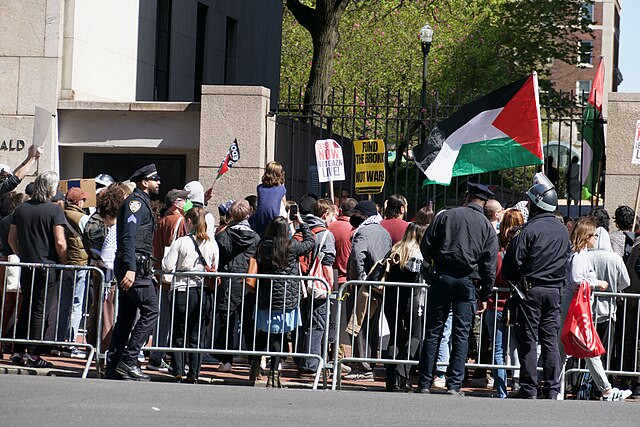A wave of student protests has swept across college campuses in the United States, with demonstrations popping up at an increasing number of universities following last week's arrest of more than 100 protesters at Columbia University in New York. The students are calling for their institutions to divest from companies advancing Israel's military efforts in Gaza and, in some cases, to cut ties with Israel entirely.
The protests, largely orchestrated by coalitions of student groups acting independently but inspired by their peers at other universities, have led to confrontations with police and accusations of anti-Semitism from pro-Israel politicians. At the University of Southern California, the main stage graduation ceremony was canceled as the campus was roiled by protests, and the university closed the campus, warning that police would arrest those who did not leave.
Similarly, at the University of Texas at Austin, police and state troopers in riot gear made dozens of arrests and forced hundreds of students off the school's main lawn. Harvard University, trying to stay ahead of the protests, locked most gates into its famous Harvard Yard and limited access to those with school identification.
Despite the crackdowns, the protests have continued to spread. At George Washington University (GW), just blocks from the White House, students set up a protest encampment on campus, joining the demonstrations sweeping colleges across the country. "We're here to show support for the students at GW and also to raise the demands of all the students in DC, which are to divest from companies that are involved in weapons manufacturing and Israeli apartheid, and to cut ties with Israeli universities because of their complicity in the Israeli genocide in Palestine," said Anna Wessels, a Georgetown student who joined the protest at GW.
The significance of the protests taking place in the nation's capital was not lost on the demonstrators. "If we weren't doing anything in DC, then we're not living up to our moral responsibility," Wessels noted.
Mimi Ziad, an activist with the Palestinian Youth Movement, emphasized that the focus of the protests remains on Gaza and Palestine, where the Israeli military has killed more than 34,000 people. "This entire encampment was made with every single messaging to be around the genocide in Gaza and to revolve around centring all of the demands on Gaza," Ziad said. "This isn't about the students. This is about Gaza. This is about all of Palestine."
Pro-Israel politicians from both major parties have been quick to condemn the protesters, accusing them of anti-Semitism. House Speaker Mike Johnson visited the Columbia campus and suggested withholding funding from universities that allow pro-Palestinian protests. However, student protesters have rejected these accusations, noting that many of the demonstrators are themselves Jewish.
"When you're accusing anyone who's against genocide in Gaza of being anti-Semitic, you're losing the actual meaning of the movement against anti-Semitism," said Donia, a protester at GW who chose to be identified by her first name only out of fear of reprisal.
The protests have drawn the attention of high-profile figures, including Israeli Prime Minister Benjamin Netanyahu, who called them "horrific," and U.S. Senator Bernie Sanders, who rebuked Netanyahu's comments. "No, Mr Netanyahu. It is not anti-Semitic or pro-Hamas to point out that in a little over six months your extremist government has killed 34,000 Palestinians and wounded more than 77,000 - 70 percent of whom are women and children," Sanders said in a statement.
As the protests continue, students remain steadfast in their commitment to standing in solidarity with Gaza and demanding change from their universities. Zaid Abu-Abbas, an 18-year-old GW student, expressed hope that the student-led demonstrations can bring about change beyond campus. "We are in DC near all these government buildings and politicians; they have no other choice but to see what we're doing," he said.





